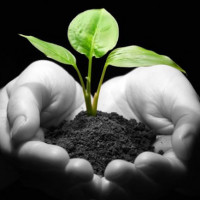
Welcome to our newest series: How to Start a New Career in the Food Industry. For many people, breaking into the food industry can be an intimidating process. Whether you’re just starting out or transitioning to food as a second or third career, it’s hard to know where to start. What career opportunities exist in food? How do your skills translate to food? How do you get a job with no experience in the industry? How do you learn as much as possible as quickly as possible? I know this, because I’ve been through (err, am still going through) it.
Though I’ve always loved food and cooking, I never wanted to be a chef. There were no food studies programs when I went to college, so I never really thought of food as a viable career. I didn’t know what other types of food jobs existed, so I maintained food as a hobby while I pursued a different professional track in theater. It wasn’t until almost a decade after I had graduated from college that I left my career in theater and restaurant work to pursue a career in food. I enrolled in a masters program in Food Studies at NYU and started an internship at a food justice non-profit. I worked hard to educate myself – voraciously reading as much as I could, launching a podcast and a food writing career. Since graduating, I have worked on the Milan Expo, the first World’s Fair devoted to food, written for numerous food publications, worked with a travel startup and started a second podcast.
While I’m still on my journey to finding my perfect food career (my dream is to find a balance between writing and radio that somehow pays the bills), I’ve learned a ton along the way, which I will be sharing with you over the next couple of weeks in our newest series: How to Start a New Career in the Food Industry. This series is going to cover the basics of how to begin navigating a career in food and agriculture, whether you are interested in marketing, technology, design, operations, media, sales, science or policy.
The first step in pursuing a career in food is to get educated. Luckily, there are endless resources available in terms of books, podcasts, movies, websites and symposiums. This first post will cover a few of the books, websites and publications, podcasts and movies out there that can help you get your bearings in the food world. Check out part 2 with a list of conferences and events to attend plus organizations that can offer an important introduction into food policy, food culture and sustainability issues.
Are we missing anything? Share additional resources here.
Looking to launch a career in food? Check out exciting food tech, design, management, operations, development and food science positions at Food+Tech Jobs.
Newsletter:
Food+Tech Connect: Twice a week Food+Tech Connect delivers all the top news in the food industry. The newsletter is a one-stop-shop for staying up to date with the latest news in the CPG, retail, restaurant and agricultural sectors.
Books:
The Third Plate: Field Notes on the Future of Food by Dan Barber: Chef Dan Barber is one of the leaders of the good food movement. At his restaurants, Blue Hill at Stone Barns and Blue Hill, Barber uses radically innovative techniques to reduce food waste and highlight underused and sustainable ingredients. In his book, Barber points to a third plate: a new way of eating where delicious food and sustainability meet.
The Omnivore’s Dilemma: A Natural History of Four Meals by Michael Pollan: Pollan’s seminal book traces four meals back to their origins. By illustrating the journey of several well-known ingredients, Pollan challenges readers to questions their food choices and rethink why we eat what we eat.
The Farm on the Roof by Anastasia Cole Plakias: Brooklyn Grange is the world’s first and largest commercial rooftop farm. The Farm on the Roof is both an inspirational story and an instructional guide for anyone looking to start a successful business that makes a positive impact.
Salt, Sugar, Fat by Michael Moss: Michael Moss is a Pulitzer Prize-winning investigative reporter formerly with The New York Times. His eye-opening book is a startling account of the processed food industry’s complicity in America’s obesity epidemic.
Devoured: From Chicken Wings to Kale Smoothies–How What We Eat Defines Who We Are by Sophie Egan: By weaving together insights from psychology, anthropology, food science and daily life, food writer and Culinary Institute of America program director Sophie Egan examines the connections between what Americans eat and how our cultural values influence our food choices.
Cooking Up a Business: Lessons from Food Lovers Who Turned Their Passion into a Career — and How You Can, Too by Rachel Hofstetter: For anyone interested in starting a food business, this book is required reading. Through interviews with notable food entrepreneurs from Popchips, Vosges Haut-Chocolat, Hint Water, Mary’s Gone Crackers, Love Grown Foods, Kopali Organics, Tasty, Evol, Justin’s Nut Butters and more, you’ll gain insight and applicable guidance to launching a successful food company.
Diet for a Small Planet by Francis Moore Lappe: Although it was written in 1985, Diet for a Small Planet remains a compelling guide for anyone who wants to minimize their carbon footprint through their diet.
Bringing it to the Table: On Farming and Food by Wendell Berry: Wendell Berry is an accomplished author, a prolific farmer, and a champion of mindful eating. His essential book, On Farming and Food, draws from over thirty years over of essays that challenge readers to make meaningful connections between the farm and the table.
Food Politics: How the Food Industry Influences Nutrition and Health by Marion Nestle: Dr. Marion Nestle has been an authority on nutrition and food policy for over four decades. Her 2013 book is a behind-the-scenes account of the often unsettling connections between the food industry and government nutrition policies.
Websites and Publications to Follow:
General Food Systems
Civil Eats: Civil Eats is a go-to publication for the good food innovation movement. It publishes daily news and commentary about our food system and works to transform the conversation around sustainable agriculture. It digs deep into food policy issues, profiles food heroes from across the country and highlights food culture.
Edible Communities: With local publications across the nation, these quarterly magazines and online publications tell stories of innovative local farmers, growers, chefs, food artisans and startups.
Food Tank: Food Tank aims to build a global community for safe, healthy, nourished eaters. Through its blog, newsletters and events, Food Tank highlights environmentally, socially, and economically sustainable ways of alleviating hunger, obesity, and poverty, and inspires the entire food ecosystem to build a better future.
Heritage Radio Network: HRN is the only online food radio station in the world. Its programming includes over 40 shows that span topics ranging from school food to craft beer. In addition to the weekly shows, the website features food news reports, interviews and event coverage
NPR The Salt: A blog from the NPR Science Desk, The Salt explores what we eat and why we eat it. It serves up stories about food science, culture, policy and innovation.
Good Food Jobs: Good Food Jobs is a site that posts jobs covering just about every sector of the food industry. The website’s blog, The Gastronomes, is a series of interviews with individuals who have found success working in food. It’s a great place to learn about the types of opportunities that exist in the food world and hear from those who have managed to achieve successful careers.
Food Tech
Food+Tech Connect: FTC is the site of record for food tech and innovation. From monthly meet-ups to interviews with industry leaders and a bi-weekly newsletter, Food and Tech Connect provides community and invaluable resources for anyone interested in the intersection of food and technology.
The Spoon: The Spoon provides daily analysis and reporting about the smart kitchen and food tech revolution with original content and an informative podcast.
The Food Rush: Through stories, podcasts and news and events, The Food Rush is focused on the future of food. Sustainability and innovation are the lens through which questions about our future food supply are explored and discussed.
CPG
Project Nosh: Project Nosh covers the world of packaged food companies and services, and in particular startup food companies focused on organic, natural and sustainable products.
Bevnet: Bevnet is a comprehensive resource for beverage industry news, reviews, events and jobs. While all beverages are covered, there is a vertical devoted entirely to spirits and one focused solely on beer news.
Fortune – At Fortune, we particularly enjoy the work of journalists Beth Kowitt and John Kell who cover food, agriculture, consumer behavior and sustainability.
ForceBrands: ForceBrands is a boutique food industry recruiting and staffing agency that helps good people find great jobs at the best food, beverage and consumer products companies.
Agriculture
Modern Farmer: Modern Farmer is a quarterly magazine and daily website covering food and agriculture, especially as it relates to policy and sustainability.
AgFunder: AgFunder is an online platform for fundraising and investing in Ag and Agtech. There is also periodic research on trends within the Agtech sector and daily coverage through AgFunder News.
Restaurants
Eater: Eater is the go-to source for all food news under the sun. Yes, there are a lot of articles devoted to unicorn lattes, but there are also hard-hitting features on immigrant restaurant workers and a whole vertical that covers food policy in the age of Trump.
Journee Blog: Journee is a membership-based community working to improve the lives of restaurant professionals. The blog is an excellent resource for insider perspectives on the restaurant industry and the topics most critical to those within it.
Movies:
Food Inc.In Food Inc., filmmaker Robert Kenner exposes how the interests of a few corporations affect America’s food supply and as a result have led to epidemics of diabetes, heart disease and obesity. Interviews with experts such as Eric Schlosser and Michael Pollan provide further insight into the disturbing connections between corporate agendas and the USDA and FDA.
King Corn: This fascinating feature documentary follows the journey of two friends who attempt to track a bumper crop of corn they’ve grown into the food system. Their findings reveal just how dependent Americans are on corn as an ingredient that turns up in everything from toothpaste to bubble gum.
Supersize Me: In order to better understand how America’s addiction to fast food is impacting our nation’s health, documentary filmmaker Morgan Spurlock eats nothing but McDonald’s for an entire month.
Forks Over Knives: Forks Over Knives investigates the claim that many degenerative diseases such as type 2 diabetes, heart disease, and several types of cancer could be prevented–and sometimes reversed by adopting an animal-free plant-based diet.
A Place at the Table: Despite being one of the world’s top producers of food, hunger continues to be a pervasive issue in the U.S. A Place at the Table examines how hunger and food insecurity impacts the lives of three individuals living in different parts of the country and how hunger could be solved once and for all if the American public decided to make it a priority.
Spinning Plates: Spinning Plates tells the stories of three different restaurants: a 150-year old family restaurant in Iowa, a Michelin-starred temple of molecular gastronomy, and a struggling Mexican restaurant in Tucson.
FRESH, the movie: FRESH celebrates the farmers, thinkers and business people across America who are re-inventing our food system. Featuring urban farmer and activist, Will Allen, sustainable farmer and entrepreneur, Joel Salatin, and supermarket owner, David Ball, FRESH offers up a vision for a healthier and more sustainable way of living.
The Garden: The fourteen-acre community garden at 41st and Alameda in South Central Los Angeles is the largest of its kind in the United States. Started as a form of healing after the devastating L.A. riots in 1992, the South Central Farmers have since created a miracle in one of the country’s most blighted neighborhoods. Growing their own food, feeding their families and creating a community.
Podcasts:
The Sporkful: Hosted by James Beard Award nominee Dan Pashman, The Sporkful is a fun foray into the world of food, culture, restaurants and eating that goes way beyond the realm of recipes.
Gravy: Produced by Southern Foodways Alliance, Gravy is an exploration of the history and diverse food cultures of the changing American South.
Eating Matters: With weekly interviews with food policy experts and leaders, host Jenna Luit tackles critical issues such as health, labor, politics and sustainabilty through the lens of food.
The Farm Report: Former Executive Director of Heritage Radio Network, Erin Fairbanks, interviews a guest each week from the agricultural sector to discuss issues such as labor and immigration.
NPR The Salt: A blog from the NPR Science Desk, The Salt explores what we eat and why we eat it. It serves up stories about food science, culture, policy and innovation.
The Spoon Podcasts: From The Spoon, The Smart Kitchen Show and the Weekly Spoon will keep you apprised of the current news in food tech and the future of cooking.
Food Startups Podcast: Hosted by food entrepreneur Matt Aaron, weekly episodes are intended to help food businesses grow and prosper.
Take Out with Ashley & Robyn: Ashley is a registered dietician and Robyn is a data analyst who studies how health trends impact families. Together they interview food industry leaders, farmers, musicians, celebrities and athletes who all want the same thing: a better food system for healthier families.
Tech Bites: Also on Heritage Radio Network, host Jennifer Leuzzi explores the intersection of technology and food and investigates the ways in which the digital world is impacting the way we produce and share food.





